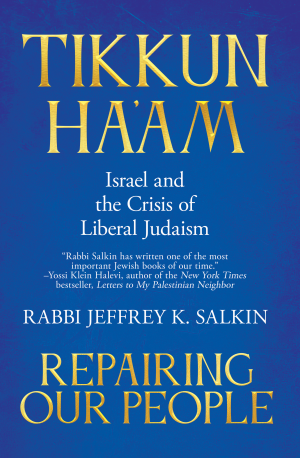The title of Elliot Cosgrove’s new book comes from the Book of Esther. When Haman’s persecution of the Jews is revealed, Mordecai calls on Esther to rise to the occasion and use her power “for such a time as this.” These words were perhaps unconsciously echoed by a friend of Rabbi Cosgrove shortly after the brutal Hamas attack on October 7th, 2023, when she expressed the need for Rabbi Cosgrove to show up for all those in his congregation and beyond. The book that has arisen out of the experience is thoughtful and analytic as well as personal and emotional.
For Such a Time as This is divided into three parts: “What Was,” “What Is,” and “What Might Be.” In the first part, Cosgrove — the senior rabbi at Park Avenue Synagogue, a flagship congregation of the Conservative movement — reflects on some of the key issues that have been recognized as problematic for Jewish identity in the Diaspora. These include assimilation, living in the Diaspora after the founding of the State of Israel, liberal Judaism’s response to Israeli policies and politics, and antisemitism. While this is ground that has been covered by others, Cosgrove enriches it with moving stories from his personal and family history.
The most powerful section of the book is the middle one: “What Is.” Cosgrove details what it was like to support a community in a moment of terrible anguish. He takes us through the stages of grief, clarity, and solidarity. Grief over the unimaginable slaughter that occurred; clarity that this was unadorned evil and must be called out; and solidarity as a result of marshaling the congregation and others to help out in any way they could. Cosgrove then discusses the strong sense of tribal identity that trauma can create.
Cosgrove uses the Book of Esther as a teaching tool, because now just as in Esther’s time, it is urgent to assert Jewish identity — an identity born not simply of tribal loyalty, but of mitzvot. He explains how to deal with the end of the Book of Esther, which describes Jews’ violent revenge and thus often goes unread in liberal congregations.
The final section, “What Might Be,” presents the hardest challenge of this timely book. While a two-state solution seems far away, Cosgrove sees it as the only path forward. But he details arguments for and against it, emphasizing the need to see all sides. We have to listen to each other, he says, not demonize each other.
Cosgrove also advocates for what he calls New American Zionism, characterized by a love for the Jewish people and an acknowledgement that while those of us in the Diaspora cannot make decisions for the State of Israel, we can speak up about policies that conflict with our values. He makes clear that New American Zionism is not a substitute for American Judaism, that we need to bring greater depth to our lives as Jews, through study and mitzvot.
For Such a Time as This is an important book that highlights the challenges facing liberal Judaism today.
Josh Hanft holds Advanced Degrees in English and Comparative Literature from Columbia University and curated the renowned reading series, Scribblers on the Roof, for over twenty years.




